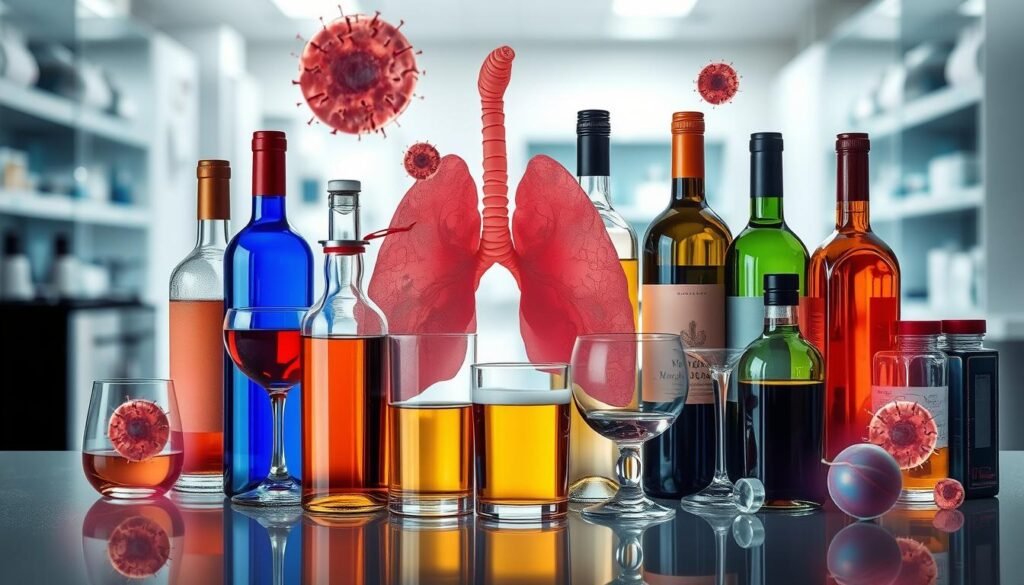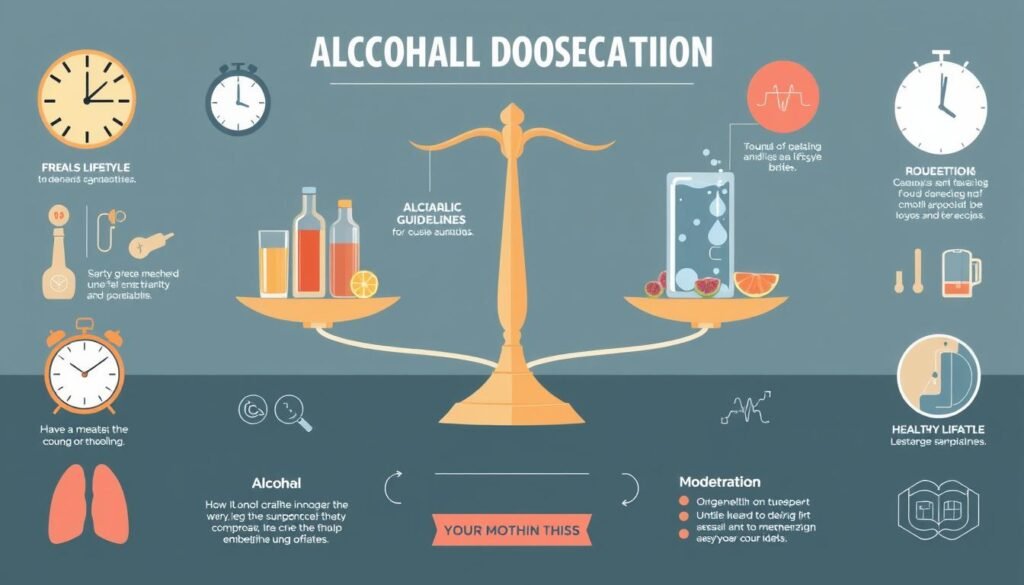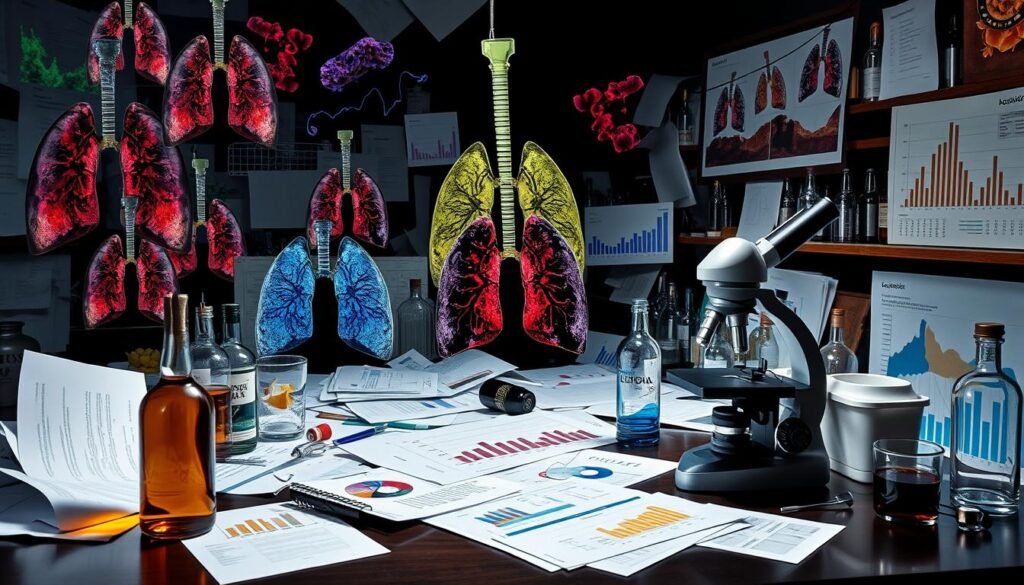Alcohol use causes about 6% of all cancers and 4% of cancer deaths in the U.S. The link between alcohol and many cancers is well known. But, how it relates to lung cancer is not as clear. While it’s known that alcohol can cause cancer, its exact role in lung cancer is still to be determined. This issue is made more complex because both alcohol and tobacco use greatly increase lung cancer risk.
This article looks at how alcohol might affect lung cancer risk. It examines research, risk factors, and drinking guidelines. The goal is to highlight this often-missed part of cancer prevention and maintaining health.
Key Takeaways
- Alcohol is linked to about 6% of all U.S. cancer cases.
- Although known to be harmful, the direct link between alcohol and lung cancer isn’t fully proven.
- The use of both alcohol and tobacco muddies the waters in lung cancer research.
- Drinking in moderation might be less risky, but advice on this varies.
- It’s important to consider things like gender, age, and health when thinking about cancer risk from alcohol.
- Continued research is key to better understand alcohol’s role in lung cancer.
Introduction to Alcohol and Cancer Risks
Alcohol has been linked to several types of cancer, like those in the head, neck, liver, and breasts. Research shows alcohol plays a big role in raising cancer risks. However, the drinking lung cancer connection is not fully proven. Few studies directly link alcohol to lung cancer, and their results vary a lot.
The effects of alcohol on lung cancer are still being studied. Too much drinking can lead to chronic inflammation. This increases the risk of various cancers by causing changes in cells. But scientists haven’t agreed on how alcohol affects lung health specifically.
The link between alcohol and lung cancer is not clear yet. But it’s important to see how alcohol might play a role in lung cancer for prevention. Smokers who also drink have a higher chance of lung disease. This makes it harder to understand alcohol’s effects on lung cancer.
Conditions like chronic inflammation caused by alcohol misuse may impact lung cancer. It’s vital to keep researching to better understand the risks of drinking. More studies will help clarify alcohol’s role in lung cancer progression.
Understanding Alcohol as a Carcinogen
Alcohol is known as a Group 1 carcinogen by the International Agency for Research on Cancer. It can cause several types of cancer, including lung cancer. Drinking alcohol can increase oxidative stress and inflammation, which may lead to cancer.
Many studies look into how alcohol affects lung health and lung cancer risk. One study with 492,902 people showed that drinking even small amounts of alcohol can affect lung health.
How alcohol consumption impacts lung cancer depends on the type of drink. Wine and liquor might lower lung cancer risk, but beer does not seem to offer the same benefit. Understanding how different drinks affect our bodies is key.
Heavy drinkers, even if they don’t smoke, have a higher chance of getting lung cancer, such as squamous cell carcinoma. This shows the need to help and inform people with Alcohol Use Disorder (AUD). It’s crucial to consider both how much and what type of alcohol is consumed for prevention and treatment.
| Alcohol Consumption Category | Odds Ratio (OR) | Confidence Interval (CI) |
|---|---|---|
| >0–4.9g per day | 0.80 | 0.70–0.90 |
| 5–9.9g per day | 0.82 | 0.69–0.99 |
| 10–19.9g per day | 0.79 | 0.65–0.96 |
Alcohol Lung Cancer: Exploring the Connection
The link between drinking alcohol and lung cancer is not straightforward. Some research shows that drinking a little might raise lung cancer risk. Other studies point out that this risk really goes up for those who drink a lot. We learn more about this as we study how alcohol might cause chronic inflammation and cancer.
Inconsistent Research Findings
Different studies come up with different results on alcohol and lung cancer. One big study with 400,000 people found that having 30 grams of alcohol each day slightly increases your risk. But, another review of 14 studies found that drinking wine might actually lower your lung cancer risk. These mixed results show why we need to keep studying alcohol’s role in lung cancer.
Role of Chronic Inflammation
Long-term inflammation is a big player in starting cancer. Drinking a lot can cause this kind of inflammation and raise your cancer risk. Yet, it’s hard to say for sure if inflammation from alcohol directly leads to lung cancer. Also, the link between alcohol and lung cancer gets more complex when you consider smoking habits. Non-smokers who drink heavily don’t face the same risks as smokers, showing the complicated relationship between alcohol, inflammation, and cancer.
The Tobacco-Alcohol Link in Lung Cancer
Studying lung cancer gets tricky because many people use both alcohol and tobacco. It’s important to see how they are linked to get the full picture of their health effects. Both alcohol and tobacco alone increase cancer risks. But together, they make it hard to see alcohol’s exact role in lung cancer.
How Smoking Complicates Research
Figuring out alcohol’s part in lung cancer is made tough by smoking. Since smoking is a top cause of lung cancer, telling alcohol’s effects apart is hard. People who drink a lot often smoke too. This mixes up the results when trying to see how each one adds to lung cancer risk. Without clear results, it’s tough for researchers to know how alcohol affects cancer.
Joint Effects of Tobacco and Alcohol Consumption
Using tobacco and alcohol together greatly raises cancer risk. People doing both could be five times more likely to get cancers in areas like the mouth and throat. For heavy users, the risk jumps up to 30 times. Realizing how these substances interact shows why it’s crucial to push for quitting smoking and reducing alcohol use.
Alcohol Consumption Patterns and Health Impacts
How you drink alcohol can greatly affect your health, especially when it comes to lung cancer. It is important to understand binge, heavy, and moderate drinking. Each has different risks for lung health. This section explains how these drinking styles relate to the risk of getting lung cancer.
Evaluating Binge Drinking and Heavy Drinking
Binge and heavy drinking are dangerous for your lungs. Drinking more than 14 drinks a week is heavy drinking. It causes chronic inflammation and weakens the immune system. This makes it easier to get sick with infections like pneumonia and TB. Binge drinking, which is drinking a lot at once, can harm your health over time too. It may even increase the chance of lung cancer.
Moderate Drinking: A Double-Edged Sword
Moderate drinking means up to one drink a day for women and two for men. It has a complex link with lung cancer risk. Some research shows it might lower the risk compared to not drinking. People who drink 10–19.9 grams of alcohol a day seem to have a lower risk. But drinking in moderation can still be harmful. Too much can cause inflammation and oxidative stress, raising cancer risks over time.
| Alcohol Consumption Types | Impact on Lung Cancer Risk | General Health Effects |
|---|---|---|
| Binge Drinking | Increased risk factors associated with lung health | Higher likelihood of respiratory infections and diseases |
| Heavy Drinking | Potential links to chronic inflammation, higher cancer risks | Weakens immune response, hampers healing |
| Moderate Drinking | Lower lung cancer risk compared to non-drinkers | May still pose risks of oxidative stress |
Types of Alcohol and Lung Cancer Risk
Different types of alcohol can affect lung cancer risk differently. Studies suggest that people who drink wine lightly or moderately may be less likely to get lung cancer than beer drinkers. It’s important to know how types of alcohol can affect your health.
Research has found a link between how much alcohol people drink and their lung cancer risk. People who consume 10–19.9 grams of ethanol daily seem to have the least risk. However, the risk is complicated. For example, drinking 20 grams or more of beer a day could increase lung cancer risk.
Lung cancer rates vary among individuals with different drinking habits. Beer drinkers, in particular, might face a higher risk. Interestingly, lung cancer is not common among those who smoke little or not at all. This highlights the various causes of lung cancer.
It’s crucial to understand what kind of alcohol you’re consuming when thinking about cancer risks. Moderation is key, particularly regarding wine, beer, and liquor. For those interested in learning more, visit Alcohol and Cancer risks.
| Type of Alcohol | Risk Level | Consumption Impact |
|---|---|---|
| Wine | Lower risk (light to moderate drinkers) | May lower lung cancer risk |
| Beer | Higher risk (with higher consumption) | Associated with squamous cell carcinoma |
| Liquor | Varied | Needs further research on specific risks |

Alcohol Use Disorder and Lung Health
Alcohol use disorder strongly affects lung health, increasing the risks for conditions like respiratory infections. Chronic drinking is directly linked to lower immune functions. This leads to a higher chance of getting pneumonia and tuberculosis.
People with alcoholism are more likely to get common infections, which can be very hard on their health.
Increased Vulnerability to Respiratory Infections
People who misuse alcohol and have lung issues are more prone to severe respiratory infections. Many cancer patients drink alcohol, and some drink too much. This can make it easier for infections to occur because their immune system gets weaker.
Impacts on Healing After Cancer Treatment
Alcohol can negatively affect lung cancer patients’ recovery after treatment. It can make the body heal slower and interfere with chemotherapy. Oncologists often say to avoid alcohol to dodge side effects like nausea and dehydration.
The link between alcohol and respiratory infections is key to understanding recovery. For more detailed information, check out studies on alcohol and respiratory infections.
Guidelines for Alcohol Consumption
Understanding the recommended limits on drinking can help people make better choices for their health. Various health groups offer alcohol consumption guidelines. These guidelines show the safe amounts and the risks of drinking alcohol. Following them can help reduce the chance of getting different cancers, such as lung cancer.
Current Recommendations from Health Organizations
The American Cancer Society and other groups stress the need for drinking in moderation. Generally, health organization recommendations advise these limits:
| Category | Recommended Limit |
|---|---|
| Men | Up to 2 drinks per day |
| Women | Up to 1 drink per day |
Sticking to these guidelines might lower the bad health effects of too much drinking. Research shows going beyond these limits can raise cancer risks. It’s important to know this for good health.
Long-term Effects of Heavy Drinking
Drinking a lot over a long time is very risky. The long-term effects of alcohol can lead to a bigger chance of getting several cancers. Excessive drinking is linked to higher risks of up to seven cancers, including breast and throat cancer. Drinking and smoking together make these risks much worse, leading to big health problems.
Knowing about these guidelines can really change your health for the better. People should keep an eye on how much they drink and learn about the dangers of drinking too much.

Alcohol’s Interference with Lung Cancer Treatments
Alcohol has a big effect on how well lung cancer treatments work. Patients and doctors need to understand how alcohol can get in the way. Drinking can make it hard for the body to break down chemotherapy drugs in the liver.
Talking openly with your healthcare team about drinking is important if you’re getting treated for lung cancer. Alcohol can do more than just lower the success of treatments. It can also make overall health worse. For example, drinking too much can weaken the immune system. This makes it hard for the body to fight infections.
This issue is more common than you might think. About 18 million Americans struggle with alcohol use disorder (AUD). This condition makes it hard for the immune system to work right. People who drink a lot are ten times more likely to get pneumonia. This is a big problem for those recovering from lung cancer treatments.
| Aspect | Impact of Alcohol Consumption |
|---|---|
| Neutrophil Function | Alcohol impairs neutrophil recruitment and function, increasing infection risk |
| Cancer Treatment | Reduced metabolism of lung cancer drugs leading to diminished treatment efficacy |
| Pneumonia Risk | Alcohol users face a 10x higher likelihood of developing pneumonia |
| Overall Health | Increased susceptibility to various infections complicating recovery |
Understanding the link between lung cancer treatment and alcohol is key. Patients and doctors should talk about how drinking can affect treatment. It’s vital for people to know how their drinking habits might impact their recovery during treatment.
Research Gaps and Future Investigations
There are still many unanswered questions about alcohol’s effect on lung cancer in non-smokers. It’s crucial to dig into how different types and amounts of alcohol affect lung health and cancer risk. This research will help us better understand alcohol’s role in cancer.
Need for More Studies on Never-Smokers
Research often misses never-smokers and alcohol, a gap in lung cancer studies. Studying how alcohol impacts non-smokers could reveal important findings. It might show us how alcohol interacts with lung cancer in those who’ve never smoked.
Alcohol Type Variability in Studies
The type of alcohol, from beer to spirits, usually doesn’t get enough attention in studies. Every drink could bring different risks for lung health. Future studies need to look into these differences to better understand the risk.

| Type of Alcohol | Potential Lung Cancer Risk | Research Focus Needed |
|---|---|---|
| Beer | Moderate | Effects on never-smokers |
| Wine | Varied | Long-term impacts |
| Spirits | Higher | Consumption patterns |
| Mixed Drinks | Uncertain | Combinations and effects |
Looking closely at these alcohol research gaps will boost our fight against lung cancer. Targeting these areas will aid in crafting better public health policies and guide individuals in their choices. For more details, click here.
Practical Recommendations for Patients
People worried about alcohol and lung cancer should focus on staying well. Following good health advice can greatly help keep a healthy lifestyle. This cuts down cancer risks. Studies show it’s vital to drink less alcohol and live healthier.
Maintaining a Healthy Lifestyle
Living a balanced life is key when dealing with cancer worries. It means doing several important things:
- Limit Alcohol Intake: Stick to the advice of not going over 10 drinks a week and 4 drinks a day for adults.
- Regular Exercise: Stay active to better your lung health and fight off tiredness from cancer treatments.
- Healthy Diet: Eat foods full of nutrients to keep your immune system strong and keep a healthy weight. Being overweight increases cancer risks.
- Stay Hydrated: Drinking enough water helps ease fatigue and boosts overall health.
- Prioritize Sleep: Get into a regular sleep pattern to help with the sleep problems that come with treatment.
Palliative care helps with managing physical pain and improving life quality. Seeing your doctor regularly is crucial for making health decisions and learning about cancer prevention. Following these tips can help reduce alcohol-related cancer risks and lead a rewarding, healthy life.
| Recommendation | Description | Benefits |
|---|---|---|
| Limit Alcohol Intake | Reduce weekly alcohol consumption to recommended levels. | Lower risk of alcohol-related cancers. |
| Regular Exercise | Engage in physical activity for at least 150 minutes a week. | Improves lung capacity and reduces cancer-related fatigue. |
| Healthy Diet | Focus on fruits, vegetables, whole grains, and lean proteins. | Supports the immune system and aids in recovery. |
| Stay Hydrated | Drink sufficient fluids daily, especially during treatment. | Helps alleviate fatigue and maintains energy levels. |
| Prioritize Sleep | Aim for 7-9 hours of quality sleep each night. | Improves mental and physical health during recovery. |
Conclusion
The link between drinking alcohol and the risk of lung cancer in people who never smoked is fascinating but complex. Studies show a lower risk of lung cancer in those who drink wine or liquor lightly to moderately, unlike beer. This conclusion comes from studying over 19,149 lung cancer cases and 362,340 people without it.
The findings point to the need for a deeper look at how different factors alter these outcomes. It reminds us how crucial it is to keep researching lung health and how alcohol affects it. Such research should especially focus on those who have never smoked.
Talking more about alcohol and its link to lung health helps people make informed choices. It also backs up actions to prevent lung cancer. It’s vital to keep investigating this topic to give health experts better tools to help us all.
To learn more about the impact of alcohol on lung cancer in non-smokers, check out this detailed study.